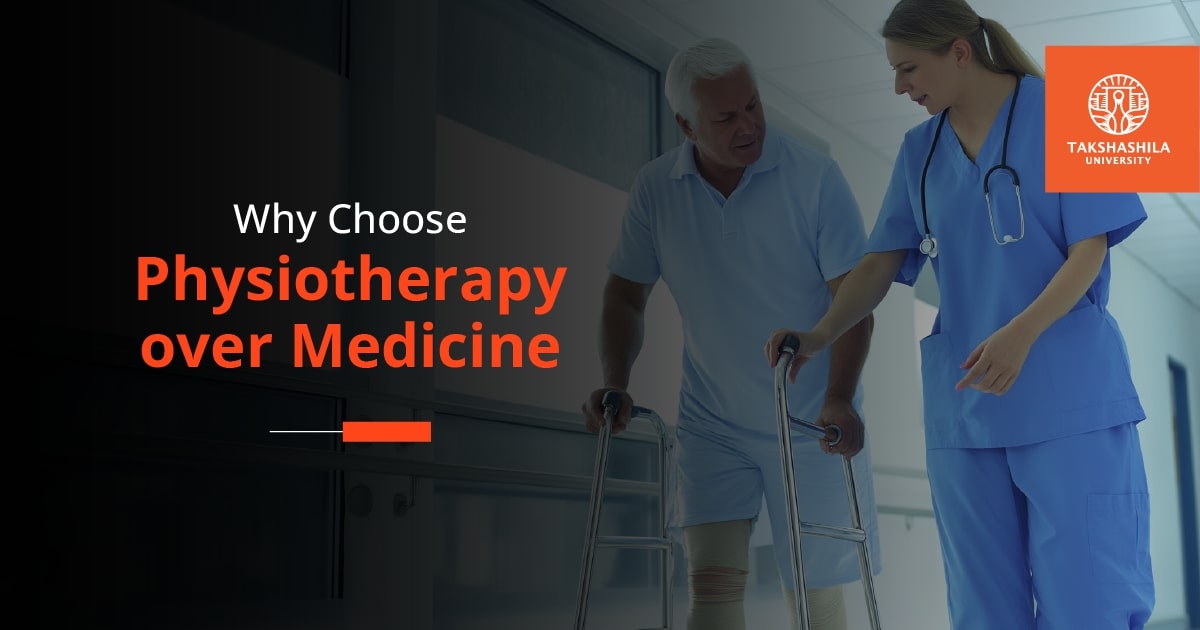Summary
Physiotherapy over Medicine – The field of medicine is constantly evolving, with research bringing about improvements in medicines and treatments. This leads to rapid growth in job opportunities. Allied health fields like physiotherapy are in demand, producing more career opportunities than conventional choices. Let’s examine why physiotherapy can be a better choice over medicine.
Introduction
According to WHO, at least 1 physiotherapist is needed for every 10,000. India is currently underserved in that regard. There are only 0.59 physiotherapists for every 10,000 in the population.
Demanding work schedules and changing lifestyles have resulted in poor posture among many adults and youngsters. This often leads to discomfort in the back, neck, knees, and shoulders. In fact, the number of individuals needing a physiotherapist is simply too high in India.
However, in recent years, there has been explosive growth in the field of physiotherapy within the healthcare sector. The demand for physiotherapy is projected to have a compounding growth rate exceeding 5% by 2026—which is great news for aspiring physiotherapists.
What is Physiotherapy?
Physiotherapy is a form of treatment focused on treating and preventing physical impairments, disabilities, and movement disorders.
Physiotherapists rely on a variety of techniques to assess and diagnose a patient’s physical problems or limitations. They suggest therapy and other exercises to help improve the patient’s mobility, reduce pain, and enhance their overall quality of life.
Here are some of the ways that physiotherapists tackle a patient’s physical problems:
1/ Guidance and Instruction
The therapist initially provides general guidance on enhancing overall well-being, like maintaining a healthy weight and engaging in regular exercise.
Depending on the area and depth of the physical issue, they will provide personalised instructions for everyday activities to help you protect yourself and minimise the risk of pain or injury.
For instance, if you’re experiencing back pain, you might receive guidance on good posture. Physiotherapists are responsible for educating you to avoid actions that involve awkward twisting, excessive stretching, or prolonged standing.
2/ Mobility and Physical activity
Physiotherapists recommend movement and exercises to gradually improve your mobility and function. This may include:
- Targeted Exercises: Specific exercises aimed at improving movement and strength in particular areas of the body. It is usually performed regularly for a recommended period of time.
- Whole-Body Activities: Activities like walking or swimming can aid in recovery from surgeries or injuries that affect mobility.
- Hydrotherapy: These exercises are performed in warm and shallow water. The water helps to relax and support muscles and joints to build strength gradually.
- Mobility Aid Advice: Provide guidance on using mobility aids like crutches or walking sticks. They also guide caretakers with the dos and don’ts while assisting a patient with movement and exercise.
3/ Manual or Manipulative Therapy
During manual therapy, a physiotherapist uses their hands to manipulate and massage the body’s tissues to address muscle and skeletal pain or disability.
This approach can help:
- Alleviate pain and stiffness.
- Enhance blood circulation.
- Facilitate more efficient fluid drainage from various body parts.
- Improve movement across different body areas.
- Encourage relaxation.
- Reduce anxiety.
- Improve sleep quality.
- Treats certain respiratory conditions (shortness of breath, cleaning impaired airways, etc.).
4/ Other Techniques
Physiotherapists can also rely on a blend of Eastern and Western treatments to create a regimen that tackles your specific issues effectively. Some of these techniques include:
- Acupuncture: In this technique, fine needles are inserted in specific points on the body to help reduce pain and support recovery.
- Transcutaneous Electrical Nerve Stimulation (TENS): A device is used to deliver electric currents to the affected area to relieve pain and reduce swelling.
- Ultrasound: This technique uses sound waves at high frequencies to treat deep tissue injuries. This enhances blood circulation and cell activity.
Factors that Impact Demand for Physiotherapy
The demand for physiotherapists has gone up for many reasons that are tied to the modern lifestyle. Some key contributors to the demand for physiotherapy around the world are:
1/ Ageing Population: As the population ages, there is a greater need for physiotherapy to manage age-related conditions such as arthritis, frozen shoulder, disc degeneration, etc.
2/ Rising Chronic Health Conditions: The prevalence of chronic health issues like arthritis, diabetes, and heart disease is on the rise. Physiotherapy can help control the glucose level in the blood, reduce the frequency of cardiovascular events, and improve patients’ life expectancy and quality.
3/ Growing Interest in Sports: There is an increasing popularity of sports amongst the urban population in India. Physiotherapists play a key role in maximising the well-being of athletes by helping them prevent injuries and aiding recovery.
Medicine Vs Physiotherapy
The medical field is highly competitive all around the world. It takes years of practice and study to excel in it. In India, there are only a limited number of seats, and students have to pass the NEET UGC Exam.
Even after completion of the course, many doctors suffer from hectic schedules and often miss out on their personal life. Despite the competition, plenty of aspiring students continue to dream of a career that saves people’s lives.
Physiotherapy is an option that students often ignore on their path to saving lives. However, it is a viable option that helps make an impact in people’s lives without taxing your personal lives in the process.
Let us look at some of the key differences between the two fields.
1/ Syllabus
Here is a look at the curricula for MBBS and Bachelor of Physiotherapy (BPT).
| Medicine / MBBS | Physiotherapy / BPT |
| AnatomyPhysiologyCommunity MedicinePharmacologyOPDsBiochemistryObst. GynaeE.N.T.Forensic MedicineOphthalmology | AnatomyBiochemistryPsychologyPhysiologyElectrotherapyPathologyExercise TherapyPharmacologyGeneral SurgeryAllied TherapiesNeurology and NeurosurgeryNeuro-physiotherapyCommunity-Based RehabilitationCommunity Medicine |
2/ Difference and Career Opportunity
| Features | Medicine / MBBS | Physiotherapy / BPT |
| Area of Expertise | -Doctors practise general medicine. -Analysis of symptoms and prescription of medicine.-Surgical intervention | Focuses on physical therapy and rehabilitation techniques that lead to the overall wellness of the patient. |
| Career Opportunities | Doctors can practise medicine in hospitals, clinics, or set up their own private practices. | Physiotherapists work in hospitals, rehabilitation centres, sports clinics, and fitness centres or even run their own private practices. |
| Employment Prospects | Doctors are always in high demand, but they need to upgrade their skills by pursuing a specialisation—which will take more time. | There is an increasing demand for physiotherapists, but specialisations take less time to complete. |
| Income | Based on their experience and specialisation levels, doctors are likely to earn high salaries. | Has competent income when working under any institution. Always has the opportunity to make more as an independent practitioner. |
Takshashila University: The Top Institute to Study Physiotherapy in Tamil Nadu
Takshashila University boasts 25 years of experience in upholding quality education. Our School of Physiotherapy has dedicated countless hours to creating the perfect curriculum for aspiring physiotherapists. The syllabus is carried out effectively by our expert faculty to ensure that each budding physiotherapist is equipped to treat patients from all walks of life.
Here is a closer look at how Takshashila University supports its students on their journey towards excellence in physiotherapy.
1/ The Physiotherapy Lab: We have state-of-the-art equipment that provides a comprehensive training environment for hands-on experience in physiotherapy. The lab enables students to learn and practise various techniques, including manual therapy, electrotherapy, hydrotherapy, and exercise therapy.
2/ Anatomy Lab: Under the guidance of experienced faculty, students engage in detailed study and exploration of the human body. The lab also supports research initiatives, fostering an environment of scientific inquiry and discovery.
3/ Library and Computer Lab: The college library contains an impressive collection of books, scientific magazines, and journals. The computer lab houses high-speed Wi-Fi with access to students and faculty carrying out various academic activities.
4/ Transportation Facilities: The university provides a dedicated fleet of buses that cover various routes within the city and surrounding areas. The campus is accessible by local public transportation, including buses and taxis, making it well-connected and easily reachable.
Takeaway
- There is a growing demand for physiotherapists due to lifestyle changes in both urban and rural populations.
- This creates immense career opportunities for students looking for alternative options within the medical field.
- There are entrepreneurial opportunities tied to physiotherapy for people who want to specialise in any particular type of therapy.
- Takshashila University is the best institute for physiotherapy in Tamil Nadu. We offer top-notch training in physiotherapy, ensuring that each student has the skills to be an industry leader in physiotherapy.
FAQs
1/ Why is physiotherapy better than medicine?
Physiotherapy is comparable to medicine due to a couple of important factors.
- No entrance examination is needed for admission.
- The duration of BPT is only 4.5 years, after which you are free to start practising.
- Rising demand has increased the potential of physiotherapy as a high-paying field.
2/ Is BPT equal to being a doctor?
No. Physiotherapy is an Allied Health Science. A physiotherapist is not a doctor.
3/ Who earns more, MBBS or BPT?
Generally, MBBS doctors tend to have higher salaries and greater recognition compared to physiotherapists. However, this can differ depending on an individual’s expertise and experience.
4/ Can a Physiotherapist perform surgery?
No. Physiotherapists cannot perform surgery.
5/ Can Physiotherapists prescribe medicine?
Physiotherapists are not allowed to practise medicine or prescribe drugs.






